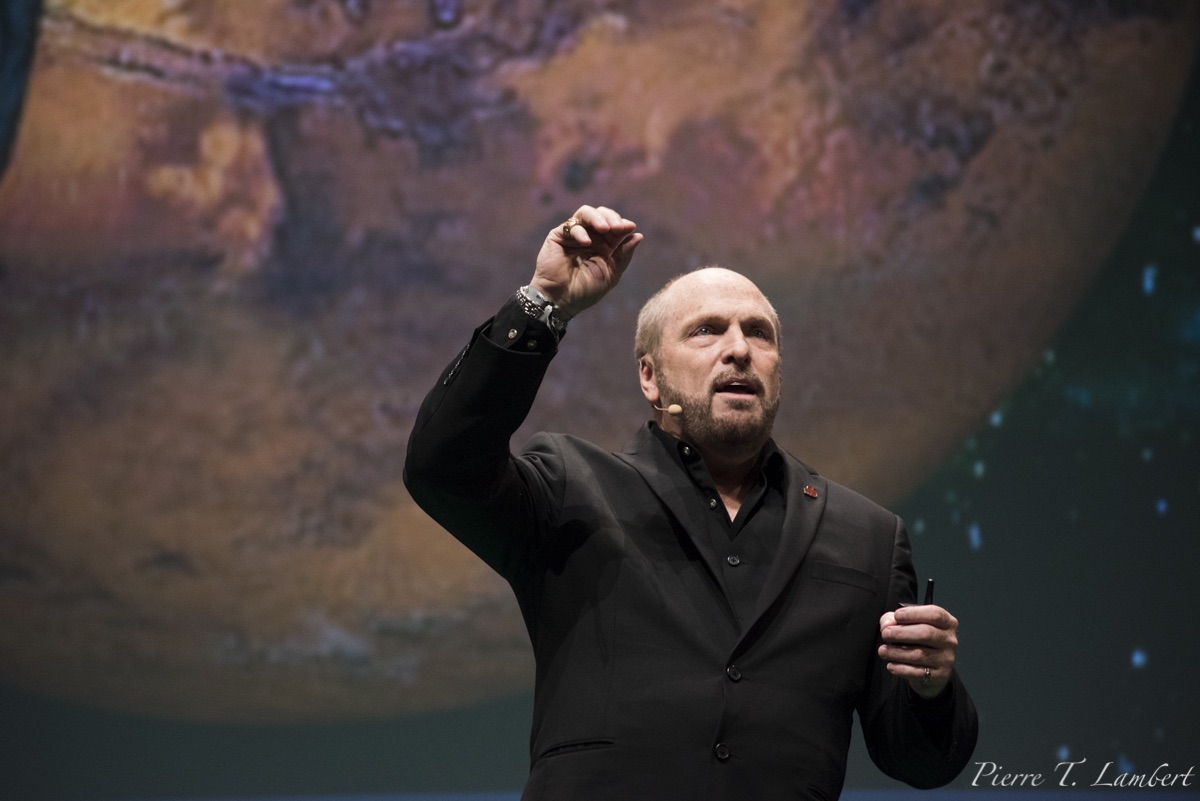Space, Race and Reality (Op-Ed)

Breaking space news, the latest updates on rocket launches, skywatching events and more!
You are now subscribed
Your newsletter sign-up was successful
Want to add more newsletters?

Delivered daily
Daily Newsletter
Breaking space news, the latest updates on rocket launches, skywatching events and more!

Once a month
Watch This Space
Sign up to our monthly entertainment newsletter to keep up with all our coverage of the latest sci-fi and space movies, tv shows, games and books.

Once a week
Night Sky This Week
Discover this week's must-see night sky events, moon phases, and stunning astrophotos. Sign up for our skywatching newsletter and explore the universe with us!

Twice a month
Strange New Words
Space.com's Sci-Fi Reader's Club. Read a sci-fi short story every month and join a virtual community of fellow science fiction fans!
For the last few weeks, Americans and people around the world have risked their lives by leaving their safe shelters from the coronavirus to protest after the murder of George Floyd captured in a video that, like the virus, circled the planet.
This event triggered wide-ranging conversations in all areas of society about the role of the police and society-wide biases regarding Black citizens. As conversations have progressed, many of us are engaging in the uncomfortable examination of our own biases — even at the subconscious level, and how these biases result in perpetuating oppression in our society.
For my own part, as a member of the space community — a field symbolizing the future as no other human activity does — I was convinced that I was too socially evolved to be prejudiced. As one who has promoted the roles of women and other underrepresented groups in my own events, and who in my private life sometimes volunteers at a food kitchen for the homeless, I was able to nestle comfortably in my own self-congratulatory state of enlightenment. After all, what field is more socially progressive than space? We are the leading edge!
Space people like to point out our field has been integrated for a long time. We"ve had a Black NASA administrator, Black astronauts, Black program directors and more. Heck, we've been working the problem ever since Uhura started helping Captain Kirk save the Enterprise! (Ironically, around the same time, Black women at NASA now nicknamed "Hidden Figures" were saving the Apollo program.)
I now see that even I am trapped in this illusion, and in my opinion we in the space community have been too smug in our belief that we've been dealing with this issue.
While we have indeed set up role models and moved forward faster than many segments of society, a lot of what we've been doing is window dressing and tokenism when it comes to diversity in real leadership roles. Space is still largely a White guy industry. Just follow the money.
I asked our research team at SpaceFund Intelligence to do just that, and what we found may surprise you. For example, of the top 20 NASA commercial contractors, not one of them is led by a Black CEO, only two have a minority leader, and only five have a woman at the helm. Only one is majority-owned by any minority, Arctic Slope Regional, which is an Alaska Native corporation.
Breaking space news, the latest updates on rocket launches, skywatching events and more!
Worse, while some are engaged in what an outsider might see as a token effort, based on our data, nine of the 20 companies have no Black board members at all. Based on information available to our team from publicly held companies, this "white" list includes major names such as SAIC, Bechtel, MAXAR, ULA and others. None. Not even a token. (Ok, I have to point this one out. According to what we found, Bechtel's sole African-American executive is its Chief Diversity and Inclusion Officer … 'nuff said.)
Sadly, even our leading edge "NewSpace" companies, many founded and run by some of the same age groups we see in the streets, aren't doing any better. While harder to examine as most are privately held, a quick close look by SpaceFund reveals that almost all of the most well-known stars of NewSpace are run by White guys. The very rare exceptions are run by women. None of them have Black or minority CEOs or board chairs. Also, lest righteous fingers point across the Atlantic, the same critique can be leveled at the European space community. The UK and European Space Agency and their contractors do a tiny bit better when it comes to female leadership roles, but again, there is no reflection of the taxpaying population at the top. This isn’t just an American problem.
Before you spin the camera back on me, I plead guilty.
As I write this our company is drawing up a plan to add more Black experts to our advisory board and will soon issue a specific call for business plan submissions by Black-, minority- and women-owned start-ups. (SpaceFund has a female Managing Partner and wee recently spun off SpaceFund Intelligence as a woman-owned business.)
I use the term "token" in my descriptions. As this discussion is fraught with possible misunderstandings, let me be clear that I get that if there is only one person of a particular race or gender in a particular role, that person can be seen as either a token or a first-of - and one should hope they are the latter. Clearly, they are of a high caliber to have the jobs. But when across company executives, boards and leadership roles the numbers are consistently in the ones and twos, well, there is a problem with the system — not the person who earned the job. A problem we must fix.
How? Simply sprinkling Black people and other members of minority groups in jobs at the top might be a good near-term signal, but unless it is accompanied by systemic shifts, the industry is simply posing. I know aerospace has a massive and effective public relations machine, but this can’t just be PR. Unlike oil companies running renewable energy ads to green-wash themselves, the space industry must make substantive and structural changes leading to real, visible results. Changing who stands on the top steps of the ladder does little to assure it is easier to climb.
I believe industry needs to convene itself immediately, with or without NASA and the U.S. government, and begin a new, intentional conversation outlining concrete steps to open the way to the top for other leaders to rise. We must identify at what rungs on the ladder things go wrong and fix them — or throw out the ladder.
As what's happening in the streets attests, we obviously can't wait for government-led solutions. Just as citizens have managed themselves in peaceful protest for change, we as a community must do so. I am not interested in sound bites from NASA administrators or congressional chairs, or in space company leaders making speeches. I don't think the folks on the streets and in our Black, female and minority communities are either.
The space community — including business, science and academia — needs to take serious, real action. Each of us, each CEO, manager, leader, institution and group, each must face our own internal frontier, come out of our own airlock with our own solutions and contributions. Each company, contractor, lab and center must step back, analyze itself and its practices, come up with a plan for change, then step up and just do it. Given that we style ourselves as a scientific and engineering culture, let's use facts, data, and testing over time to assure the actions we take are not just feel-good words, photo ops and token gestures, but have provable, real results.
This really is one of those moments when the future can be changed. Space has led the way before, and especially in recent decades the space and science communities have tried to do the right thing — something for which we should be proud. For example, in speeches I point out that even in times of Cold War-like tension there is one place in the solar system where Russians and Americans don't just work together, but love each other as deep friends, and it's just a couple hundred miles overhead in the International Space Station. If we can do that, we can certainly do this.
Black lives do matter. And it matters what the space community does right now in support of this cause.
Space is for ALL humanity. The signal that we can send the world from space is powerful.
Let's craft a new reality that doesn't just signal with images, but signals real change.
Rick Tumlinson is the founder of SpaceFund, a venture capital firm investing in space startups. He also founded the Space Frontier Foundation, Earthlight Foundation and New Worlds Institute and is a founding board member of the X Prize Foundation.

Both a rebel and a respected leader, Rick is listed as one of the top 100 influential people in the space field. Called one of the world’s top space “visionaries,” Rick helped coin the term "NewSpace" and worked to create the new commercial space industry highlighted by Elon Musk and Jeff Bezos.
A leading writer, speaker, and six-time Congressional witness, Rick helped start the first mission to find water on the Moon, signed the first ever commercial data purchase agreement with NASA, helped start NASA’s Lunar Exploration Analysis Group, led the commercial takeover of the Russian Mir space station, signed the first private astronaut to fly to the space station, co-founded the Space Frontier Foundation, and was a founding board member of the X-Prize.
As a result of his world-changing work, in 2015 he won the World Technology Award along with Craig Venter of the Human Genome project. He founded the SpaceFund venture capital company with 19 space companies in its portfolio and is a member of the US Space Force Doctrine Advisory Group.
Rick's The Space Revolution "radiopod" is featured on IHeart Radio Network's iRoc Space Radio and is available on most major podcast sites. He hosts the New Worlds Conference and the Space Cowboy Ball in Austin, Texas, and his non-profit EarthLight Foundation is creating an inclusive new movement to use space to protect the Earth and expand life into the cosmos.
